Everything You Need To Know About Solar Energy
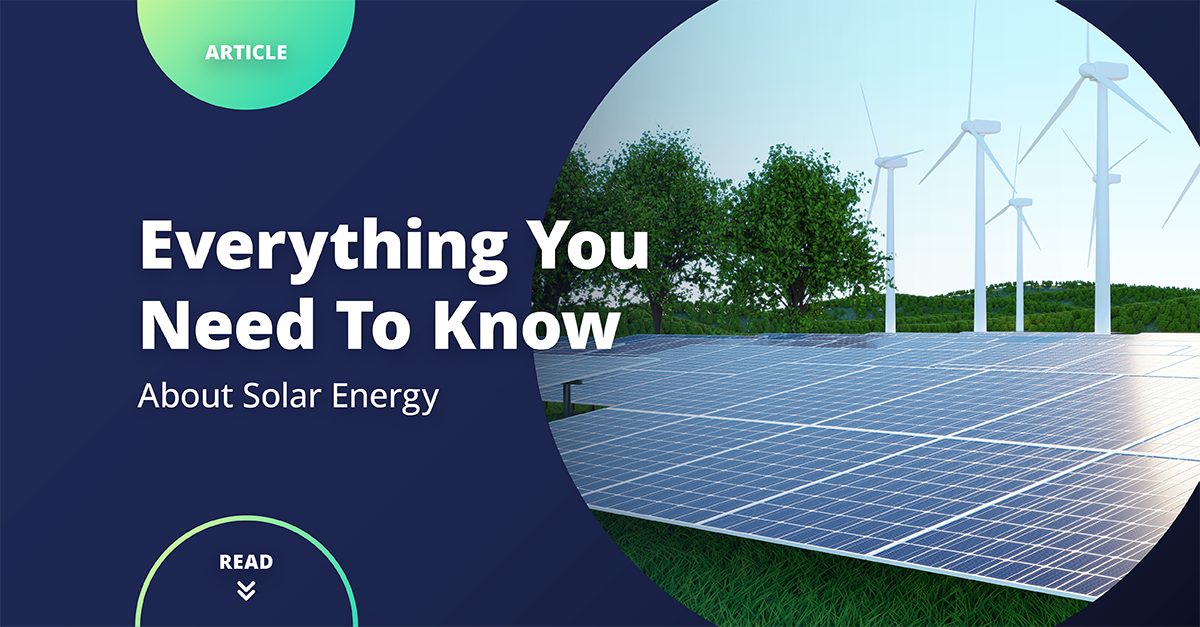
Renewable energy is slowly replacing fossil fuels as our primary energy source. Just look at the growth of solar energy production: in 2009, we could generate 21 terawatts of solar energy. In 2020 though? Almost 850 terawatts of solar power! And as the installation costs of solar panels have drastically fallen as well, that makes using solar energy an excellent way to help businesses cut their energy bills.
How does solar power even work, though, and what are the biggest reasons you should use solar energy to power your business? Read on – our solar power basics guide should answer all your questions.
How does solar power work?
Nowadays, solar energy can power everything that needs energy as well as fossil fuels can – but without greenhouse gas emissions, water pollution, or any other negative consequences for the environment. And as solar panels can be installed basically anywhere (even in colder regions) and keep generating energy as long as there’s enough sunlight, solar power is now actually one of the most affordable energy sources. How exactly do solar panels turn sunlight into electricity though?
How solar panels generate electricity
If you have ever seen a solar panel, you probably noticed that it is made up of many small squares. Those squares are called solar cells, photovoltaic cells, or PV cells. When the solar cells (made of semiconductors like silicon) are exposed to light, a part of the light is absorbed within the semiconductor material. The energy then knocks the electrons inside the cells loose, allowing them to flow freely – creating an electric current. The energy coming from the solar cells has to be converted into electricity for us to be able to use it to power our devices though.
How solar power is turned into electricity
Solar panels produce something called Direct Current (or DC) electricity – meaning it flows in one direction. The thing is though, most of the devices we use run on alternating current or AC (meaning the electrons can switch directions in which they move).
So to use solar energy, we need to convert it into AC via an inverter. Once the solar energy has been converted, it will work exactly the same way as the electrical power generated through the grid, so you don’t need to worry that any devices or machines at your company might malfunction.
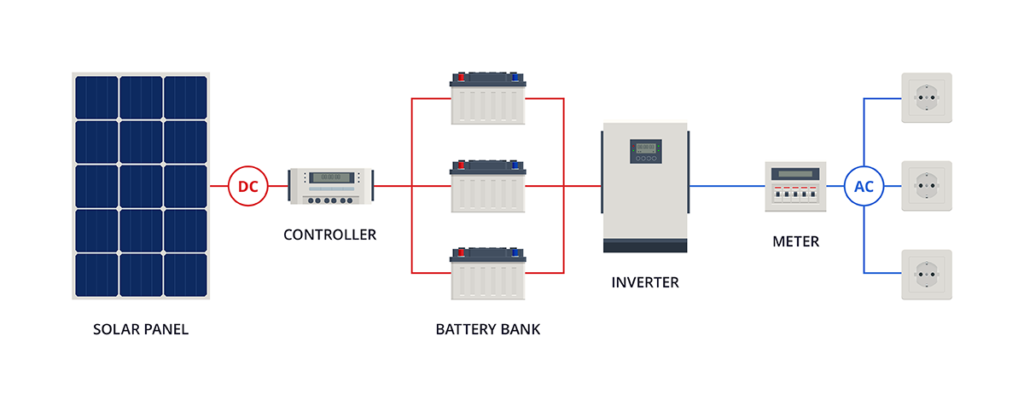
Do solar panels work when it’s cloudy or during the winter season?
What often worries businesses when it comes to solar panels is whether they work during cloudy or rainy weather, for example, in the winter season, or do they work only during warm days. The good news is that solar panels will work no matter what the weather outside is like.
While they do work best when there’s plenty of sunlight around, they can generate energy also during cloudy mornings and short winter days. The amount of energy produced will be naturally lower than during spring or summer months, but the panels will nonetheless keep generating it. Rain can actually make solar panels work better by washing away any dust or dirt that might block light.
Even more interesting is that solar panels work better in colder temperatures. Solar panels generally work at peak efficiency between 15°C (59°F) and 35°C (95°F). Above that, their performance might decline by around 10%-25%, according to CED Greentech.
What are the biggest benefits of powering your business with solar energy?
While we are still far from replacing fossil fuels with only clean energy, renewable energy does slowly reduce the need for those. In 2021, wind and solar generated 10% of global electricity – so we are on the right track to lower our dependence on fossil fuels. What’s more, solar energy can also bring plenty of benefits to businesses – we’ve summed up the main ones below.
1. Sunlight is an endless energy source
Let’s start with the most obvious benefit – we don’t have to worry about the sun stopping shining any time soon. Scientists estimate that the sun will have enough energy to keep shining for at least 5 billion years – so we don’t have to worry about “running out” of solar energy anytime soon.
What’s also important is that solar panel efficiency has dramatically improved over time, meaning they can catch and turn into electricity far more solar energy than in past years. In 2012, for example, the highest solar cell efficiency was a little below 18% (meaning 18% of the sunlight hitting the cells could be turned into usable energy). In 2020 meanwhile, developers at National Renewable Energy Laboratory (NREL) in Golden, Colorado, revealed that they had created a solar device with a record-breaking efficiency of 47.1%.
Of course, it will likely take a while before such highly efficient solar panels become widespread – for now, the average solar panel efficiency is 15-20%. But as long as your premise gets sunlight at least a few hours a day, the solar panels will keep generating energy for you every day.
2. Significantly reduces energy bills
Businesses are looking at solar panels with such interest nowadays because they might help them cope with growing out-of-control energy prices. Especially since budget savings can really be quite impressive. Since you are generating your own electricity on-site, that means you can rely less on traditional energy suppliers – so your bills naturally go lower.
According to EnergySage marketplace data, an average commercial property owner paid $1,950 in monthly electric bills before going solar in their operations. After installing solar plants though, their bills dropped to around $500 a month.
Plus, if your solar panel system can generate more energy than your business uses, you can sell your excess power to the electrical grids and get paid for the amount of energy you sell. So that way, not only do you get energy almost for free, but you can even earn a bit selling it – though how much you can gain depends on the solar power regulations in your country or state.
3. The installation costs keep getting lower
As the upfront costs for installing the solar system might seem pretty high, that often makes businesses (especially on the smaller side) believe that only larger companies can afford it. The good news is though, the installation costs have fallen drastically in the last ten years, both thanks to the much lower cost of producing the solar cells and various tax credits a business can apply for after installing the solar panels.
According to the US Department of Energy’s Berkeley Labs, installing a solar plant costs have fallen by 75% since 2010, and they keep getting lower. What’s also important is that solar plants have an average lifespan of 25 years – but it usually takes only 5 to 7 years for them to pay for themselves. So after that time, you’ll be getting virtually free power for years to come.
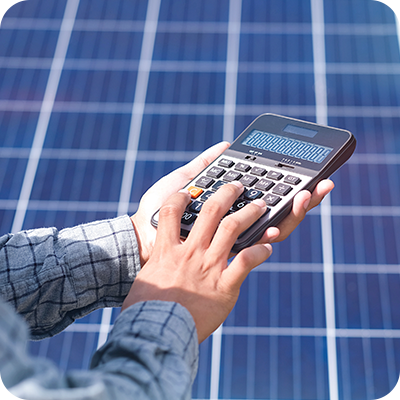
4. Low maintenance costs
Another amazing aspect of solar panels is the low maintenance costs involved in keeping them. There are no moving parts inside you have to take care of, and the panels themselves are very hardy, so you don’t have to worry about rain or snow damaging them. Most owners manage just fine by cleaning them a couple of times a year at most, and that’s it.
As a result, once you have covered the installation costs, you don’t have to worry about spending a lot on maintenance or repairs needed – so that’s another part where you can save.
5. Reduce your environmental impact – and boost your reputation in customers’ eyes
Solar energy is currently one of the cleanest energy sources available in the world. There are no harmful emissions to the atmosphere, generating the energy from the sun causes no pollution, and there’s no fuel needed for the panels to work either.
As a result, the solar panel’s carbon footprint is roughly 20 times lower than the carbon output of coal-powered electricity sources.
But besides being much better for the planet, solar energy can also give you an edge over your competitors. In a Statista survey, 45% of consumers stated that they were interested in finding brands that were sustainable or environmentally responsible. Moreover, 92% of customers said they are more likely to trust a brand that is environmentally or socially conscious. That’s why showing that you are replacing traditional, “dirty” energy sources with nature-friendly ones like solar power can actually be a great marketing move for you.
6. Improves your energy security and independence
It can be worrying to hear in the news that experts predict blackouts or energy cuts brought on by skyrocketing gas, oil, and coal costs. Solar panels though could make your business less vulnerable to those. As you won’t need to rely as much on traditional energy suppliers, that will also lower the risk your business might be affected by unstable energy prices or energy shortages.
Additionally, suppose your storage systems were to keep extra energy stored there. In that case, you can have a backup power supply that you can use when needed (for example, during cloudy days when the solar power generation is lower).
Are there any cons to picking solar energy to power your business?
As you can see, there are plenty of reasons why solar energy is only becoming more and more popular with businesses. Solar panels do, however, have a few downsides as well.
1. Despite the falling price, solar panels are still quite costly
The first one is, obviously, the upfront cost. While the installation costs are dropping every year, the end price can still put a significant dent in your budget.
Based on one solar panel’s installation company website, the average installation prices are:
- Small system at 25kW: $50,211
- Small-medium at 50kW: $100,423
- Medium system at 100kW: $200,846
- Large system at 250kW: $502,113
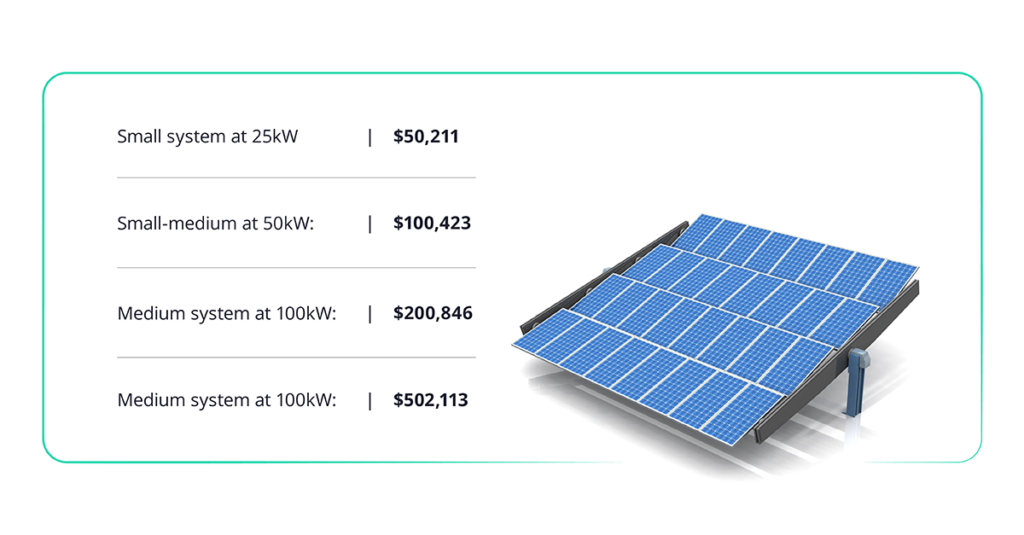
Keep in mind this is only a rough estimate as the final price will depend on the location, number type, and size of solar panels you need and whether you are installing a storage system together with the solar plants. Fortunately, many countries are now encouraging businesses to invest in solar panels with tax deductions or other benefits companies can take advantage of to help them move to cleaner energy sources.
2. Finding a good spot for the solar panels
Where exactly you will install solar panels will also require some planning as it will have a massive impact on how much energy the solar panels can produce during a day.
A lot of businesses simply install the panels on their roofs because then the panels don’t take up any extra space. However, not all roofs are good places to install panels. Solar panels work best when they are facing south, are tilted at a specific degree, and don’t have any shading-creating obstructions nearby (buildings, large trees, etc.). If your company’s office roof doesn’t fit those requirements, there’s not enough space to place the panels, or you aren’t sure whether the roof can support the weight of the panels, then going for ground mounts might be a better idea.
Unfortunately, ground mounts are more expensive than roof mounts since the solar panels must be installed on a rack structure that is connected to the ground with steel beams or another type of metal post. That also means that you will need more land space to put the ground mounts on.
3. The generated solar energy must be used immediately
The last issue is that the solar cells can’t actually store the solar energy themselves, so the energy must be used straight away. The solar grids also have limiters that can lower energy production to prevent generating excess energy that would be wasted. That, unfortunately, means that during sunny days the solar panels might work only on a fraction of their power (to make sure the panels only generate as much power as needed) and that there might not be enough solar energy to use during cloudy winter days or after sunset when the energy production is lower.
Fortunately, solar energy storage systems can easily solve both problems – we’ll talk about that in the next article.
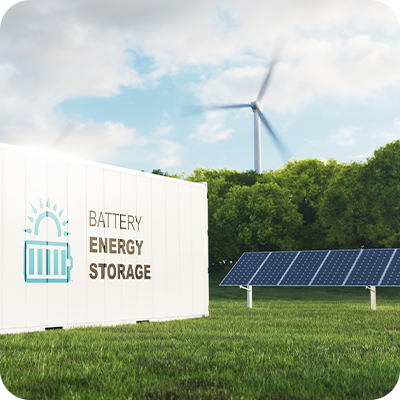
Conclusion
Solar energy is becoming an increasingly popular option when it comes to powering businesses of all sizes and industries. Not only is it a great way to reduce energy bills and help companies cope with fluctuating energy prices, but it can also boost brand image in the eyes of ecologically conscious consumers.
While installing solar panels might require a bigger investment at the start, you will also start seeing savings almost straight away – and after a few years, you’ll be getting energy nearly for free.
contact us
Need expert guidance on your next energy project?
Reach out to us and discover how Codibly can offer tailored solutions to drive your business.